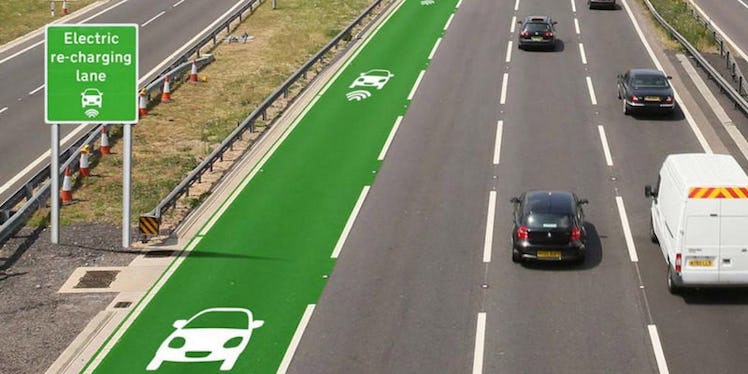
These Roads In England Will Charge Electric Cars While They're Driving
The future of England's highway system could involve roads that recharge electric cars when the battery-powered cars drive on them.
One major issue when it comes to getting a green car is the mileage you give up by switching to a battery-powered vehicle; gas-fueled cars easily get over 300 miles on a full tank, but cars running on electricity top out at 260 miles when fully charged.
Unless you plan your trip around finding charging stations on the way to your destination or somehow figure out how to hack the physical properties of electricity, this puts a major cap on taking a long-distance trip with a glorified Energizer battery strapped to your car as an engine.
But Highways England may have solved this problem with roads that recharge electric cars.
The UK government-owned company is beginning an 18-month trial run on these recharge lanes now that it completed a feasibility study.
Cars specifically outfitted with special wireless technology will receive battery charges from electromagnetic fields created underneath the roads of these charging lanes as they drive.
Special coils inside the vehicles pick up the electromagnetic currents and then convert them into electricity.
You know, science.
England will start testing this technology with the hope of bringing a finished product to major roads in the future.
In a press release, Andrew Jones, the UK's minister of transport, seemed pretty jazzed about this whole thing coming together. He said,
The potential to recharge low emission vehicles on the move offers exciting possibilities. The government is already committing £500 million over the next five years to keep Britain at the forefront of this technology, which will help boost jobs and growth in the sector. As this study shows, we continue to explore options on how to improve journeys and make low-emission vehicles accessible to families and businesses.
South Korea already offers a form of this technology called Shaped Magnetic Field in Resonance (SMFIR) that charges public buses as they drive over specialized strips of road.
England also has a similar system in Milton Keynes, though it involves the bus being stationary as it charges on special plates.
Highways England's large-scale plan of charging cars on the go is a lot harder to achieve, and Dr. Paul Nieuwenhuis, the director of Cardiff Business School's Electric Vehicle Centre of Excellence, isn't buying it.
He told the BBC,
It makes sense to try it out, and the technology does obviously work, But it sounds very ambitious to me. Cost will be the biggest issue and I'm not totally convinced it's worth it.
Nieuwenhuis also pointed out there may not even be a need for this. He continued,
Battery technology is increasing - if you look at what Tesla has achieved in recent years, it keeps adding more [travel] range to battery technology roughly every six months. So, it's not clear there's even a need for this.
Plus, we're all going to be traveling by hoverboard in the future, anyway.
Citations: The UK is testing out roads that charge electric cars as they go (Mashable)